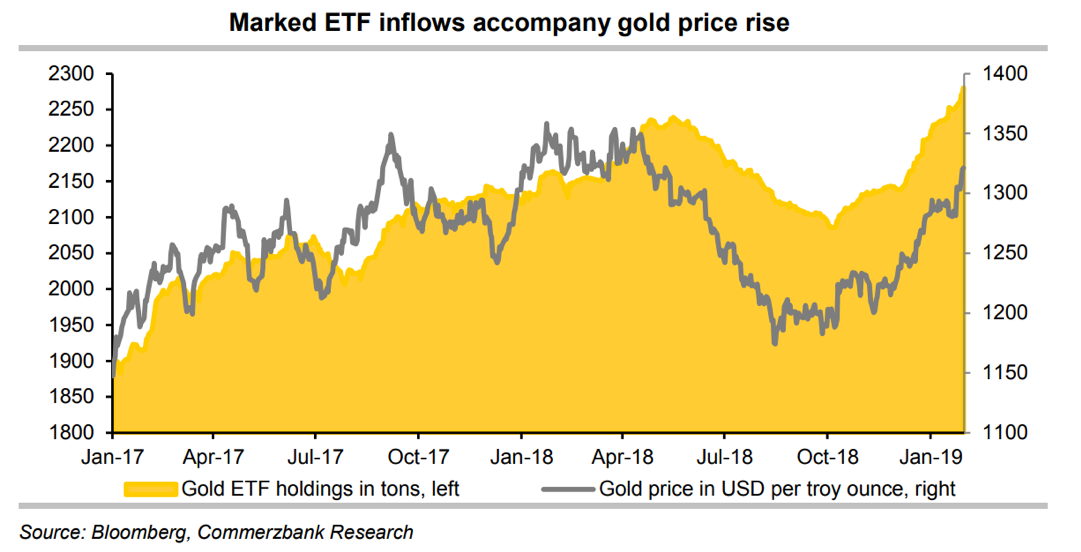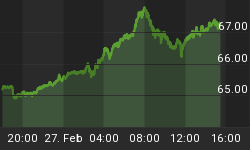Stocks mixed at start of the week. U.S. equities were down a bit to the start the week, but markets received some positive news in recent days. A strong jobs report, positive corporate earnings, and some reasonably optimistic economic data from China provided some reassurances about the health of the economy. The U.S. Federal Reserve also provided some tailwinds last week when it backed off interest rate hikes. But even after the best January in decades for U.S. equities, China still looms as one of the biggest downside risks to further gains.
Chart of the Week

(Click to enlarge)
- Investors are flooding back into gold, boosted by a dovish policy stance from the U.S. Federal Reserve.
- Holdings of gold in ETFs tracked by Bloomberg jumped by over 70 tons in January, “almost equivalent to the total inflows of last year,” Commerzbank wrote.
- Gold prices have been rallying since the third quarter of 2018, and have attracted renewed interest from investors.
Markets
Corporate earnings up, jobs up. Market sentiment received a jolt over the past few days with a strong U.S. jobs report on Friday, which showed that more than 300,000 jobs were added in January despite the government shutdown and slowing global growth. We are also halfway through earnings season, and U.S. corporates have reported stronger-than-expected earnings for the fourth quarter. Roughly half of the S&P 500 reported fourth-quarter earnings that were up 18 percent from a year earlier, stronger than the expected 15.5 percent. Still, analysts expect growth to slow this year.
China service sector maintains momentum. The world has been closely watching the economic slowdown in China, but recent data on the Chinese services sector has eased concerns somewhat. In January, the Caixin/Markit services purchasing managers’ index (PMI) fell only slightly to 53.6, down from 53.9 in December. Although that shows a bit of a slowdown, the figure is still above 50, indicating growth. Related: Investors Anxious Ahead Of Big Week
GM to slash jobs. GM (NYSE: GM) confirmed that it was beginning another round of mass layoffs. Over the next two weeks, the company will shave off 4,000 white collar jobs. The cuts are part of the CEO Mary Barr’s plan to cut during relatively good times, a plan that she hopes will save the company $2.5 billion. Last year, the company announced the shuttering of five North American auto plants.
Commodities
“Great Game” for lithium in Bolivia. Global powers are jockeying for control of lithium deposits in a handful of countries around the world. Germany just inked a lithium deal with Bolivia, edging out a Chinese competitor. China has already invested $4.2 billion in South American lithium over the past two years, according to Reuters, and Chinese companies control nearly half of global lithium production and 60 percent of battery production.
Gold making a comeback after a down decade. After a decade of lackluster interest, gold producers see the market heating up. Last September, the $5.4 billion purchase of Randgold Resources by Barrick Gold Corp. (NYSE: GOLD) “set off a chain reaction,” Bloomberg reports. Newmont Mining (NYSE: NEM) shelled out $10 billion for Goldcorp in January. The flurry of deals combined with higher gold prices has “re-ignited” interest in the gold sector.
Gold prices up on Fed reversal. The U.S. Federal Reserve issued an about-face last week, essentially declaring that it would suspend further interest rate hikes. The end to the central bank’s hawkish stance was hugely positive for commodities, including gold. Gold hit a recent peak at a $1,326 per troy ounce. “Now that the Fed has signalled the provisional end to its rate hike cycle, and rate hike expectations have been completely priced out by the market in response, gold is becoming a more attractive alternative investment,” Commerzbank wrote in a note.
Energy
U.S. sanctions on Venezuela similar to Iran. The U.S. sanctions on Venezuela are stricter than they first appeared. On Friday, the U.S. Treasury published details on the sanctions, and they are more sweeping than first advertised, resembling sanctions on Iran. Companies will be barred from doing business with Venezuela using the U.S. financial system. That could deter most oil companies and traders from buying Venezuelan oil. As a result, the 500,000 bpd of Venezuelan oil exports could struggle to find a home.
Oil market tightens on rig count decline, Venezuela outages. Oil prices were choppy at the start of trading on Monday, but the fundamentals point to a tightening market. The U.S. rig count plunged last week, offering more evidence of a drilling slowdown. OPEC’s production also fell sharply in January. The brewing outages in Venezuela could significantly augment the OPEC+ cuts, quickly tightening the market. “Overall in crude there are no clear signs of an overhang right now,” Olivier Jakob, managing director of Petromatrix GmBH, told Bloomberg.
Related: Europe’s Mining Sector Sees Slowing Growth
Oil majors post strong profits. The oil majors reported one of their best financial performances in years in 2018, despite the selloff in oil prices in the fourth quarter. ExxonMobil (NYSE: XOM), Royal Dutch Shell (NYSE: RDS.A), and Chevron (NYSE: CVX) all posted impressive numbers. Profits of the top five oil majors could reach $84 billion for 2018, up from just $10 billion four years ago.
Cryptocurrencies
Canadian crypto exchange owes customers money. Canadian crypto exchange QuadrigaCX owes customers $190 million and cannot access most of the funds, according to CoinDesk. The founder of QuadrigaCX, Gerald Cotton, died in December, and he reportedly had sole control over some aspects of the exchange.
Twitter’s Jack Dorsey bullish on Bitcoin. Jack Dorsey, CEO of Twitter, said that Bitcoin would probably become the internet’s “native currency,” and still has a bright future. “I believe the internet will have a native currency and I don’t know if it’s bitcoin. I think it will be [bitcoin] given all the tests it has been through and the principles behind it, how it was created,” Dorsey said on a podcast with Joe Rogan. “The world ultimately will have a single currency, the internet will have a single currency,” Dorsey added. “I personally believe that it will be bitcoin … (It would happen) probably over ten years, but it could go faster.”
Silver linings in crypto’s bad year in 2018, and what’s next this year. In 2017, Bitcoin and other cryptocurrencies exploded in popularity, with a bull run minting millionaires around the world. However, it all came crashing down in 2018, a major popping of the bubble. But there were some silver linings in 2018, including a record for token sales and initial coin offerings (ICOs). Cryptonews offers some predictions about where the cryptocurrency market is heading in 2019.
By Michael Kern for Safehaven.com
More Top Reads From Safehaven.com:
















